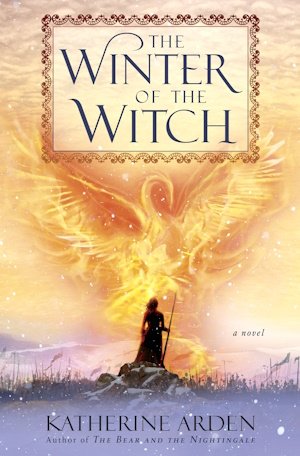He killed the other.
Once they strangled maidens in the snow, Morozko had said. To court my blessing.
Once? Or now? Which midnight is this? Vasya had heard the fairy tale, but she had never imagined it: a woman separated from her
people, the frost-demon vanished into the forest.
Vanished, but not alone.
Once he’d been nourished on sacrifices.
Morozko and Medved were alike once, she thought, her lips cold.
In the winter-king’s face was a clear and unthinking joy, the hawk’s hunger when he tears the rabbit to pieces. He got to his feet, took the woman’s hand.
All around, a new tension began to build.
Into the silence came a single sound; the ringing chime of a drawn sword. Heads turned; it was the man with dark eyes, who had not been able to keep his hand from his sword-hilt. His face was naked with agony.
“No,” he said, “take another; you shall not have her.” Many hands tried to hold him back, but he broke their grip, hurled himself forward, and swung his sword at the winter-king in a single, blind stroke.
Morozko held no weapon. But it didn’t matter. With his bare hand, he caught the blade as it fell. A wrench and a twist and the sword clattered to the floor, sheathed with frost. The tawny woman cried out; the dark-eyed man blanched.
Morozko’s hand streamed water like blood, but only for a moment.
Frost crept over the cut place and sealed it.
The winter-king said softly, “You dare. ”
Yelena fell to her knees. “Please,” she begged. “Do not hurt him.”
“Do not take her,” pleaded the man, facing the winter-king with empty hands. “We need her. I need her.”
Deathly silence.
Morozko, a line between his brows, might have hesitated.
In that moment, Vasya strode out into the open space herself. Her kerchief had fallen from her hair. All heads swiveled toward her.
She said, “Let them go, winter-king.”
She was remembering Moscow, walking through the slush toward her own death. It was bitter memory that put the rage in her voice
when she said, “Is this your power? Taking women from their fathers’ halls at Midwinter? Killing their lovers too, when they try to prevent you?”
Her voice rang through the hall. Cries of anger rose. But none dared break into the ritual space nearest the fire-pit.
Yelena’s hand crept out and took hold of the man’s. Their knuckles were bone-white. “My lord,” she breathed. “That is only a foolish girl, a mad girl, who came a beggar out of the snow on Midwinter night.
Never mind her; I am the sacrifice for my people.” But she did not let go of the man’s hand.
Morozko was watching Vasya. “This girl doesn’t think so,” he said.
“No, I do not,” snapped Vasya. “Choose me. Then take your sacrifice, if you can.”
Everyone in the hall recoiled. But Morozko laughed; free and wild and so like the Bear that she flinched despite herself. In his eyes was a blaze of heedless joy. “Come here then,” he said.
She did not move.
His eyes locked on hers. “Do you mean to fight, little maiden?”
“Yes,” said Vasya. “If you want my blood, take it.”
“Why should I, when there is another, fairer than you, waiting for me?”
Vasya smiled. Something of his unthinking joy—in challenge, in battle—echoed in her soul. “What pleasure in that, winter-king?”
“Very well,” he said, drew a knife and lunged. When he moved, the knife caught the light with a wavering spark, as though the blade were made of ice.
Vasya backed up, her eyes on the weapon. Morozko had given Vasya her first knife and taught her how to use it. The way he moved was imprinted on her consciousness, but that patient teaching was a far cry from—
She seized a knife from the belt of one of the watchers. The man gaped at her, wordless. The knife was short-hafted: plain mortal iron against the winter-king’s shimmering ice.
Vasya ducked Morozko’s strike, and came up on the opposite side of the fire, cursing her rough shoes. She kicked them off, the floor icy on her feet.
The crowd fell silent, watching.
“Why come to me?” he asked her. “Are you so eager to die?”

























